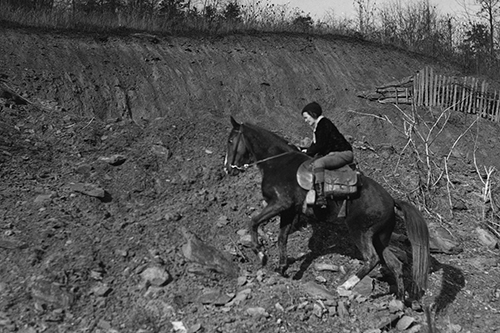Images from the Pack Horse Library Project
A special thank-you to Lisa Thompson, Librarian II Archival Services Branch, Archives and Records Management Division, Kentucky Department for Libraries and Archives.
Unless otherwise noted, photos are used courtesy of the Pack Horse Librarian Photo Collection, Archives and Records Management Division—Kentucky Department for Libraries and Archives.

Book carriers ready to take the trail from Hindman, Kentucky. Known to the mountaineers as “book women,” their arrival was always a welcome sight to the mountain-dwelling folk.

Sometimes the short way across was the hard way for a horse and rider, but schedules had to be maintained if readers were not to be disappointed. Then, too, after highways were left, there was little choice of roads.

The interior of a Pack Horse Library Center at Wooton, Kentucky. Main libraries were located in county seats, but attractive centers supplied outlying communities with reading materials.

Courtesy of Archival Services Branch, Archives and Records Management Division—Kentucky Department for Libraries and Archives

When newspapers passed circulating usefulness, they added comfort, cleanliness, and warmth to the bare walls of a mountain cabin.

Courtesy of Library Special Collections, Western Kentucky University
The Pack Horse librarians delivered 3,548 books monthly.

The “book woman” did not always have a bridge to cross and had to find a shallow ford.

Invalids, shut-ins, the old, and the blind would receive the benefits of books. If they were unable to read and there was no one to read to them, the “book woman” found time to read to them.

Schoolchildren were encouraged to take books home to read. The closing of school did not end this habit, for children continued to meet the carrier at the schoolhouse. Many children read aloud at home to their parents who could not read. Children’s books were greatly in demand, and there was always a shortage of them.

Neither snow-covered hillside nor lack of roads daunts the “book woman.”

Library service was not restricted. White families, black families, and teachers had the opportunity to benefit by library use. Library centers for blacks were established in black communities.

Courtesy of Archival Services Branch, Archives and Records Management Division—Kentucky Department for Libraries and Archives

Winter and summer alike found the “book woman” reaching the mountain readers. Farm journals and agricultural bulletins of the state and national government gave mountain farmers knowledge for improvement of their crops; however, the demand was far greater than the supply.

Schoolhouses like this only had a few textbooks. Teachers selected books for reading and class work from Pack Horse libraries. During the four years of WPA service, there were frequent reports of better schoolwork due to the books furnished by WPA carriers.

A Pack Horse librarian delivers books to a patron.